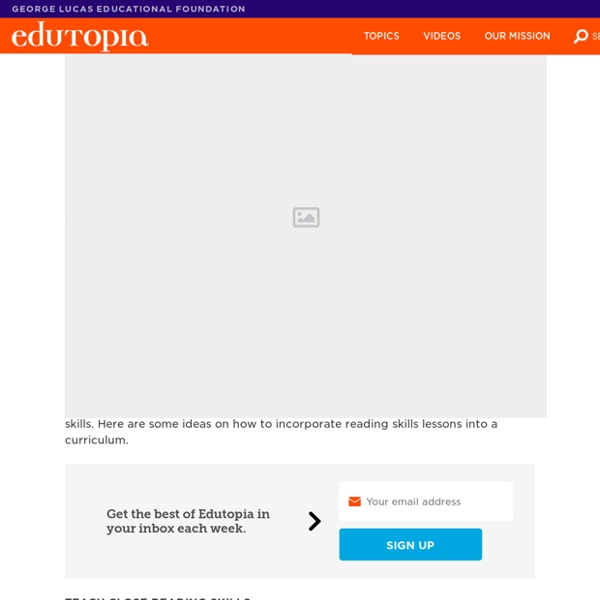What are literacy skills?
Literacy skills help students gain knowledge through reading as well as using media and technology. These skills also help students create knowledge through writing as well as developing media and technology. Information Literacy Students need to be able to work effectively with information, using it at all levels of Bloom's Taxonomy (remembering, understanding, applying, analyzing, evaluating, and creating). Information literacy involves traditional skills such as reading, researching, and writing; but new ways to read and write have also introduced new skills:
A Skill Strong Readers Share
Students in classrooms across the United States spend an estimated 85 percent of their school day on assignments that require reading texts. A key difference between students who can read well and those who cannot is the ability to use metacognition. Metacognition can be regarded as a conversation readers have with themselves about what they are reading. Metacognitive readers enjoy reading because they can find meaning in texts and think deeply to comprehend what they’re reading.
Sorry, But Speed Reading Won’t Help You Read More
The late Nora Ephron famously felt badly about her neck, but that’s minor compared to how people feel about their reading. We think everyone else reads faster than we do, that we should be able to speed up, and that it would be a huge advantage if we could. You could read as much as a book critic for the New York Times. You could finish Infinite Jest.
csal.gsu.edu
Mission Statement CSAL is committed to understanding reading-related characteristics that are critical to helping adult learners reach their reading goals and to developing instructional approaches that are tailored to adult learners’ needs and interests. CSAL General Overview Each year, nearly 3 million Americans enroll in adult literacy programs to improve their basic skills, and some estimates suggest the need is even greater. Adults in these programs want to increase their literacy skills to improve aspects of their work, family, social, and civic lives. However, we do not completely understand their underlying reading-related strengths and weaknesses, nor do we know the best curricula and teaching approaches to help them reach their reading goals.
Reading Skills Pyramid - Put Reading First Intro
The Research Building Blocks for Teaching Children to Read Kindergarten Through Grade 3 The Research Building Blocks for Teaching Children to Read This publication was developed by the Center for the Improvement of Early Reading Achievement (CIERA) and was funded by the National Institute for Literacy (NIFL) through the Educational Research and Development Centers Program, PR/Award Number R305R70004, as administered by the Office of Educational Research and Improvement (OERI), U.S.
Thinking about Thinking: The Power of Noticing
According to Einstein, “Education is not the learning of facts, but the training of the mind to think.” I completely agree that learning to think should be one of the essential goals of education, but as I wrote in an earlier post, many of the tasks we set for kids and the scaffolds we teach them to use don’t really seem aimed at fostering thinking as much as completing those tasks. In that post, I offered an example of what a lesson focused on actual thinking might look like. And here, I’d like to take a deeper look at what we really mean by thinking and how we actually do it. One of the most common definitions you’ll find online is that “Thinking is a purposeful organized cognitive process that we use to make sense of our world.”
The Buffett Formula
“The best thing a human being can do is to help another human being know more.” — Charlie Munger “Go to bed smarter than when you woke up.” — Charlie Munger Most people go through life not really getting any smarter. Why? They simply won’t do the work required. It’s easy to come home, sit on the couch, watch TV and zone out until bed time rolls around.
Are You a Learner?
We have a lot of great things for you to read! There are easier, medium, and harder stories. Everyone is different. You might find some harder stories easier to read because you know a lot about the subject. You might also find that some easier stories may not be so easy because they have words that you find hard to read. We hope you try reading all kinds of stories!
How to Improve Your Reading Skills
How to Improve Your Reading Skills back The University of Alabama Center for Academic Success 124 Osband 348-5175 Eighty-five percent of college work requires reading. How good are your reading skills? Here are seven steps to help you improve your reading skills: 1.



